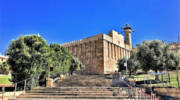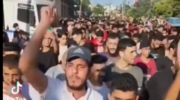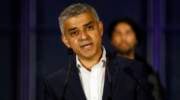Some members of Israel’s police force will assist disabled children at the Jerusalem Marathon next week.
By Maayan Jaffe/JNS.org
For a child with a severe developmental disability, walking just one step could be a feat. To complete 800 meters (2,625 feet) would be a miracle. But on March 13, that will be a reality as 15 youths “run” a special course as part of this year’s Jerusalem Marathon.
The race was arranged by ALEH, Israel’s largest organization serving people with the most severe intellectual and developmental disabilities. The youths will use special walkers and other support devices to complete the race, and will be accompanied by one or two Jerusalem police officers.
The event is the brainchild of an ALEH physical therapist who approached Alon Hassid — the father of Or Hassid, who lives at one of ALEH’s residential facilities for people with disabilities, and a marathon employee — about the idea. Alon was able to arrange it, and last year, seven children walked 400 meters (1,312 feet) while accompanied by ALEH staffers. This year, the length of the event is doubled (as is the number of children participating) and the uniformed officers will add an emotional and touching dimension.
“The police are a hard organization — they are not used to bringing emotion into their work,” says Alon Hassid, whose son has brain damage that cripples his ability to walk, talk, or often eat on his own. “Here, you can see the officers’ hearts.”
Eighteen police officers have been training with ALEH residents since immediately after Rosh Hashanah last fall. They were each paired with a youth with a disability and were taught how to talk with, maneuver, and support the kids. In some cases, the residents’ disabilities are so severe that they require help from two officers to participate in the marathon.
“In the beginning, it was really hard to go there,” says police officer Zaloo Adisu, who is working with Efrat, an ALEH resident. “It was so painful to see children who are 5 or 6 years old unable to walk, like vegetables. It makes you uneasy… But after a while, you realize there is nothing you can do, that God decides and then you start to accept them and realize you just have to help. Now I am happy to be there and glad to help.”
Adisu, who like the other police officers volunteers for two hours on Sunday mornings, says she has seen tremendous progress with Efrat, whom she described as a 12-year-old girl trapped in a 6-year-old body. Efrat cannot communicate verbally. Each week, Adisu brings a keychain with a small running shoe. She holds it out for Efrat to touch. In the beginning, there was little reaction. But now, according to Adisu, Efrat’s eyes are smiling, and the teenager knows that Adisu has come to work out with her.
“In the beginning, Efrat couldn’t go,” Adisu said. “She cried when I tried to walk with her. She couldn’t do even one step. This is not the Efrat I met in the fall. Now, she is going five minutes straight, sometimes even without her walking machine. Every week, I see her progress more.”
Adisu will walk behind Efrat to give her confidence and an extra push, if necessary.
Tziki Raz, an ALEH staff member who has been helping to organize the race, described the kids’ excitement when they see the officers arrive in their uniforms. Raz can sense the children’s pride in walking alongside the cops. She also stresses the important of physical activity for the youths, who are bound to wheelchairs and other devices for most of the day.
Rivka Keesing, director of academia and research for ALEH, seconded Raz’s statements — and noted that the collaboration between the officers and ALEH has meant a lot for the police, too.
“The officers tell us that they are so busy and at first they did not know how they could give up two hours a week to volunteer at ALEH,” Keesing said. “But now the officers see that doing this, helping these children gives them so much strength that they work faster and get even more done when they return from ALEH to work. We look at them as giving us something huge, and as giving the students and ALEH strength. Now, they say, ‘You are also giving us strength to do our jobs.’”
Staffers at ALEH believe that having the officers walk with the youths will bring needed publicity to both ALEH and the plight of the children with disabilities.
“ALEH’s goal is to give every severely disabled person in Israel the opportunity to reach their full potential,” says Dov Hirth, director of marketing and development for ALEH. “That’s what we do for the individuals. From the point of view of society as a whole, ALEH is working to change the way that people view those with disabilities. And we work very hard to make sure that the world as a whole sees that those who have disabilities, who live with difficult circumstances, should not be shunned or, God forbid, forgotten about.”
Hassid, with his son Or in mind, adds, “The public needs to hug people and children like this and do everything that can do to get them involved… If you can make them happy, make them happy when you can. If we are in a circle, these kids have to be in the middle of the circle — not on the side.”
Do You Love Israel? Make a Donation - Show Your Support!
Donate to vital charities that help protect Israeli citizens and inspire millions around the world to support Israel too!
Now more than ever, Israel needs your help to fight and win the war -- including on the battlefield of public opinion.
Antisemitism, anti-Israel bias and boycotts are out of control. Israel's enemies are inciting terror and violence against innocent Israelis and Jews around the world. Help us fight back!






















